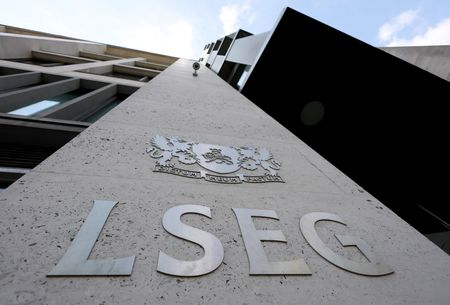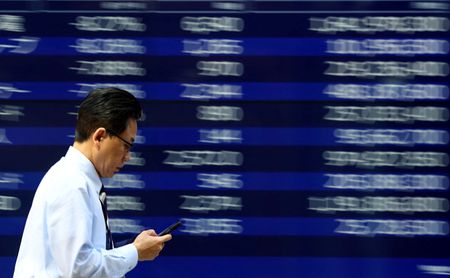By Lawrence Delevingne and Marc Jones
(Reuters) -Wall Street and world stocks were mostly higher on Thursday, and U.S. Treasury yields fell, as a cooling U.S. labor market and dovish comments from Federal Reserve officials pointed to a likely interest rate cut this month by the central bank.
U.S. private payrolls increased less than anticipated in August, while weekly jobless claims came in higher than expected, in the latest data suggesting easing labor market conditions.
Traders on Wall Street and in Europe pushed equities up despite Chinese bourses tumbling overnight on reports that Beijing wanted to cool a red-hot stocks rally, especially the tech sector. [.EU] [.N]
The Dow Jones Industrial Average, S&P 500 and Nasdaq all gained between 0.4% and 0.6%, while the FTSEurofirst 300 rose 0.6%.
Oil prices extended their weak week after a Reuters report that OPEC+ officials are looking at increasing output targets this weekend, while the dollar was drifting ahead of Friday’s crucial jobs report. [O/R] [/FRX]
Several key Federal Reserve officials have bolstered expectations of an imminent U.S. rate cut in recent days. Money markets are now pricing in a near-100% chance that one will be delivered at the Fed’s meeting in just under two weeks.
European bond buyers nudged down the German 30-year bond yield to 3.3%. France’s was down a touch more at 4.39%, having hit 4.523% on Tuesday, its highest since June 2009, on worries that its government could collapse again.
“We believe bond investors are focusing on the long-term sustainability of current deficit growth rates,” Scott Wren, senior global market strategist at the Wells Fargo Investment Institute, said in a client note on Thursday. “Meanwhile, the U.S. economy is slowing, which puts some downward pressure on yields.”
SALESFORCE SHARES SLUMP
One outlier to the pre-payrolls lull was a 5% slump in Salesforce shares after third-quarter revenue disappointed Wall Street’s analysts due to lagging monetization of AI-powered products.
While AI euphoria has driven the main U.S. indexes to repeated record highs this year, momentum has ebbed since numbers from Nvidia and others failed to wow investors.
Overnight, the main action had been in China following a report that regulators were preparing cooling measures for equity markets.
Beijing blue chips fell as much as 2.6%, while the tech-heavy STAR 50 index, which soared nearly 30% last month, dropped more than 6% in its worst day since April. [.SS]
In the U.S., payrolls are not until Friday – keeping investors on edge – but traders watched the nomination hearing of Stephen Miran, U.S. President Donald Trump’s pick to replace resigning Fed board member Adriana Kugler. Miran told U.S. senators that no one in the Trump administration has asked him to promise to cut interest rates if he is confirmed as the Fed’s newest policymaker.
Concerns over Fed independence have done nothing to relieve pressure on major governments’ debt prices, so there was relief that an auction of 30-year Japanese bonds had gone smoothly in Tokyo overnight.
Australian shares advanced 1%, recovering from their biggest one-day sell-off since April, while Tokyo’s Nikkei 225 ended 1.5% higher. [.T]
India’s benchmark Sensex rose as much as 1% as markets reopened after the government slashed levies on several goods to fire up consumption and counteract U.S. tariffs.
Wednesday’s Federal Reserve “Beige Book” had painted a mixed picture of the U.S. economy, which appeared to underscore monetary policymakers’ concerns. Analysts at ING called it “bleak” and said it was littered with warnings about the inflationary effect of import tariffs on prices.
The yield on benchmark 10-year Treasury notes inched down to 4.178% in early U.S. trading with the more rate-sensitive 2-year yield at 3.59%, around its lowest level since the start of May.
The dollar edged up 0.4% against the yen to 148.6, keeping within the trading range where it has stayed since the beginning of August.
It was also fractionally higher against the euro at $1.1637. In commodities markets, Brent crude dipped another 0.8% to around $67 a barrel and gold edged back 0.25% after hitting a record high of $3,578.5 an ounce on Wednesday. [GOL/]
(Reporting by Lawrence Delevingne in Boston and Marc Jones in London. Editing by Kevin Liffey, Jan Harvey and Matthew Lewis)












